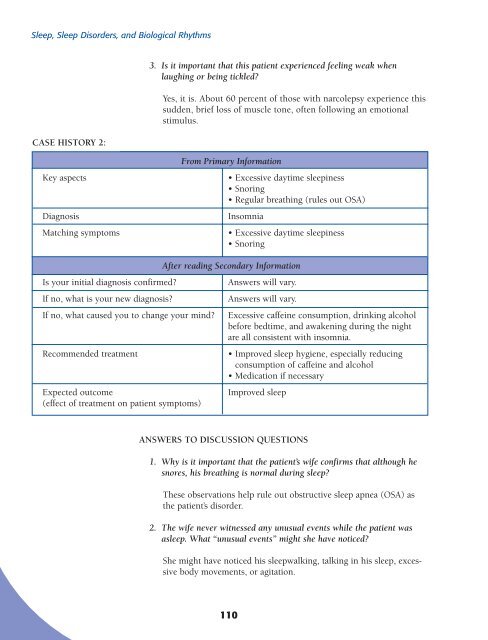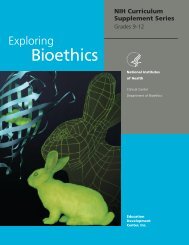Biological - NIH Office of Science Education - National Institutes of ...
Biological - NIH Office of Science Education - National Institutes of ...
Biological - NIH Office of Science Education - National Institutes of ...
Create successful ePaper yourself
Turn your PDF publications into a flip-book with our unique Google optimized e-Paper software.
Sleep, Sleep Disorders, and <strong>Biological</strong> Rhythms<br />
CASE HISTORY 2:<br />
3. Is it important that this patient experienced feeling weak when<br />
laughing or being tickled?<br />
Yes, it is. About 60 percent <strong>of</strong> those with narcolepsy experience this<br />
sudden, brief loss <strong>of</strong> muscle tone, <strong>of</strong>ten following an emotional<br />
stimulus.<br />
Key aspects<br />
Diagnosis<br />
Matching symptoms<br />
From Primary Information<br />
• Excessive daytime sleepiness<br />
• Snoring<br />
• Regular breathing (rules out OSA)<br />
Insomnia<br />
• Excessive daytime sleepiness<br />
• Snoring<br />
Is your initial diagnosis confirmed?<br />
If no, what is your new diagnosis?<br />
If no, what caused you to change your mind?<br />
Recommended treatment<br />
Expected outcome<br />
(effect <strong>of</strong> treatment on patient symptoms)<br />
After reading Secondary Information<br />
Answers will vary.<br />
Answers will vary.<br />
Excessive caffeine consumption, drinking alcohol<br />
before bedtime, and awakening during the night<br />
are all consistent with insomnia.<br />
• Improved sleep hygiene, especially reducing<br />
consumption <strong>of</strong> caffeine and alcohol<br />
• Medication if necessary<br />
Improved sleep<br />
ANSWERS TO DISCUSSION QUESTIONS<br />
1. Why is it important that the patient’s wife confirms that although he<br />
snores, his breathing is normal during sleep?<br />
These observations help rule out obstructive sleep apnea (OSA) as<br />
the patient’s disorder.<br />
2. The wife never witnessed any unusual events while the patient was<br />
asleep. What “unusual events” might she have noticed?<br />
She might have noticed his sleepwalking, talking in his sleep, excessive<br />
body movements, or agitation.<br />
110

















